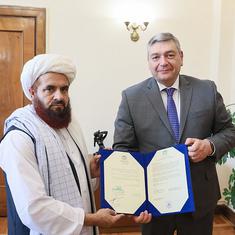Weekend Reads:
- Stephanie Kirchgaessner tells the story of how the NSO Group, which built the controversial Pegasus spyware, became the source of a cyberweapon that could be sold to countries all over the world.
- “Democracies are, of course, not like individuals,” writes Sushant Singh, whose phone was targeted using Pegasus spyware. “When my cellphone was hacked, I could survive the ordeal to tell my story. But when a democracy is hacked, it runs the risk of dying, with no one left to tell its story. That is my fear of today’s India. That fear must not be allowed to come true.”
- “As the monsoon session runs its course, the really damaging punches to the government are likely to be made over its failures on the issues of price rise, pandemic and farmers, not the issue of surveillance,” writes Asim Ali. “Yet, it is the growing authoritarianism of the government, highlighted by the Pegasus scandal, that is at the root of what afflicts the country.”
- “After seven years of Modi, I now watch democracy die quietly in India from faraway Hong Kong, where democracy was never born but it never felt that way, and its supposed passing is widely mourned,” writes Debashish Roy Chowdhury.
- Preeti Zachariah tells the story of “the iron women of Manipur who live and breathe Olympian dreams.”
- “Even an inflatable tyre doesn’t quite mean the safety saddle that beginners use in swimming, in this story of the making of India’s trendsetter in water set to go to Tokyo Games,” reports Shivani Naik. “While Sajan [Prakash] was younger and chiselling his stroke-movement in Bangalore needing his mother Shantymol to make overnight 380 km journeys every weekend from her home in Neyveli, she carried torches routinely in her duffel bag to help bus drivers fix punctures on unlit, potholed roads.”
- Parul Sehgal reviews Akash Kapur’s new book on Auroville, which “revisits a utopian city with fondness and fury.”
- Priyanka Pulla tells the story of how India was blindsided by a deadly outbreak of mucormycosis, the ‘black fungus’.
- “The crackdown on China’s internet industry seems to be part of the country’s emerging national industrial policy. Instead of simply letting local governments throw resources at whatever they think will produce rapid growth (the strategy in the 90s and early 00s), China’s top leaders are now trying to direct the country’s industrial mix toward what they think will serve the nation as a whole? And what do they think will serve the nation as a whole? My guess is: Power”, writes Noah Smith.
- Peter Wohlleben examines recent research about plants and concludes that they may feel pain, possibly even see and that humans should retire older hierarchical classifcations that place ourselves at the top of the pile with plants at the bottom.










